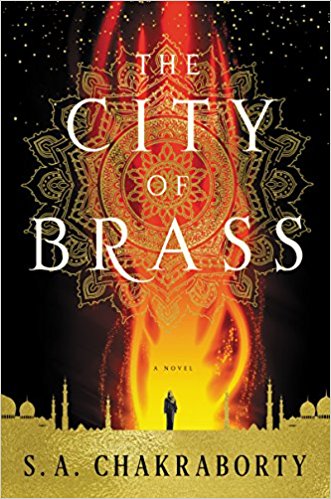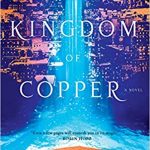 The City of Brass (The Daevabad Trilogy, #1) by S.A. Chakraborty
The City of Brass (The Daevabad Trilogy, #1) by S.A. Chakraborty Formats available: hardcover, paperback, ebook, audiobook
Series: Daevabad Trilogy #1
Pages: 528
Published by Harper Voyager on November 14th 2017
Purchasing Info: Author's Website, Publisher's Website, Amazon, Barnes & Noble, Kobo, Bookshop.org
Goodreads
Nahri has never believed in magic. Certainly, she has power; on the streets of 18th century Cairo, she’s a con woman of unsurpassed talent. But she knows better than anyone that the trade she uses to get by—palm readings, zars, healings—are all tricks, sleights of hand, learned skills; a means to the delightful end of swindling Ottoman nobles.
But when Nahri accidentally summons an equally sly, darkly mysterious djinn warrior to her side during one of her cons, she’s forced to accept that the magical world she thought only existed in childhood stories is real. For the warrior tells her a new tale: across hot, windswept sands teeming with creatures of fire, and rivers where the mythical marid sleep; past ruins of once-magnificent human metropolises, and mountains where the circling hawks are not what they seem, lies Daevabad, the legendary city of brass--a city to which Nahri is irrevocably bound.
In that city, behind gilded brass walls laced with enchantments, behind the six gates of the six djinn tribes, old resentments are simmering. And when Nahri decides to enter this world, she learns that true power is fierce and brutal. That magic cannot shield her from the dangerous web of court politics. That even the cleverest of schemes can have deadly consequences.
After all, there is a reason they say be careful what you wish for . . .
My Review:
I picked up The City of Brass because this was the book that its publishers were the most extremely enthused about in my research for the Library Journal SF/Fantasy Spotlight article. Now that I’ve read it, I understand completely. However, as I read The City of Brass, it also kept reminding me of other stories. It just took me awhile to figure out exactly which stories.
There’s certainly an element of The Goblin Emperor in one side of this story, as Prince Ali feels very much like a young prince who stands very much outside the system and whom the power-that-be expect to consume alive at their earliest opportunity. And Nahri is certainly every bit as much a “fish out of water” (as bizarre as that pun becomes in context) as Maia ever was. Possibly even more, as Maia at least knows the court exists, even if he never expects to rule it. For Nahri, Daevabad is a city of out the vague mists of legend, and legends that she doesn’t even believe in.
But Daevabad feels like something out of a twisted, extended version of Scheherazade’s tales of the Thousand and One Arabian Nights. With just a little bit of Persian, Indian and other mythologies thrown in for spice. And bodies. But the story that our heroine Nahri finds herself in the middle of has been going on, not for 1,001 nights, but for for millennia.
The story begins with scam artist Nahri sizing up her next mark. And it ends with Nahri sizing up her next mark. But in between – it’s magic.
At the beginning, Nahri is a con artist, scaping together a living on the streets of 18th century Cairo, trying to blend in. But Nahri has just a little bit of magic, something that she conceals at every turn, because its a gift that will either get her eaten alive, or killed, or possibly both.
Nahri can heal. I don’t mean that she’s a doctor, although she sometimes operates on the fringes of what passed for medicine in her time and place. I mean that she herself heals miraculously. Any wounds that she receives heal themselves in almost the blink of an eye.
But she can also heal others. It takes will and concentration, but she can cure almost anything by visualizing the body the way it should be. It’s a gift. And also a curse, because Nahri does not know how or why she has this gift.
She doesn’t believe in magic, but a lot of people do. So Nahri dabbles, just a bit, in scams that look like magic to others. And that’s what gets her in big, big trouble.
Because instead of “calming the spirit” of an afflicted child, Nahri accidentally calls up an evil spirit, an ifrit, who wants to eat her and her magic before it proceeds to rampage through the streets of Cairo. And in the wake of the ifrit follows a djinn who vowed to serve and protect Nahri’s family over a millennia ago.
But djinn are not exactly what Nahri thinks they are. And neither are ifrit. And most especially, neither is she.
The City of Brass is the opening chapter in Nahri’s journey to discover who and what she is, and where she belongs. And it is absolutely captivating from beginning to cliffhanging end.
Escape Rating A+: At the beginning, I said that The City of Brass reminded me of 2014’s marvelous The Goblin Emperor. While the fantasy settings derive from rather different origins, the flavor at the heart of the story feels the same. They are both stories of outsiders who find themselves thrust into a cut-throat world of high stakes politics, where everyone around them has hidden agendas buried under hidden agendas. And where everyone who surrounds them intends to keep them in the pawn position, subservient to others, lost and alone, and barely one step ahead of being killed by their own ignorance or innocence.
Both stories feature people who are playing a game that they do not initially understand with stakes that are always deadly, not just for themselves, but for anyone around them who gets caught in the crossfire.
And ironically, they are both personages who should have the ultimate power in their universes, but don’t because of circumstances outside of their control. And both of them find themselves subverting the system from within just to survive long enough to figure out their next move.
If they have one.
The story that begins with The City of Brass is both a story of hidden magical kingdoms and the story of two young people who discover that power is much “realer” than belief, and that for those in power, the ends always justify the means.
While the story follows Nahri and her transit from the human world to the kingdoms of the djinn, it is at its heart a very political story. Nahri’s existence has the ability to upset the balance of power between the ruling djinn family and the mixed blood people they exploit at every turn. Every faction plans to take advantage of her presence, whether with her consent or not.
We watch her struggle to make, find and understand her place throughout the story. And then, marvelously, just as this chapter comes to a close, we finally see her grasp the reins of her own destiny, as only she knows how.
I can’t wait to see what happens next in The Kingdom of Copper next year. Nahri is a heroine to watch – and cheer for.


















Aaah, you mentioned The Goblin Emperor, I’m doomed. I keep rereading it because I just love Maia, heh. I’m so eager to read this book too, though.
Maia, Ali and Nahri would have a LOT to talk about. As they dodged their respective sets of assassins. I wouldn’t mind reading that book…
Marlene Harris recently posted..Stacking the Shelves (262)